A complete guide to build your ideal Custom CRM system
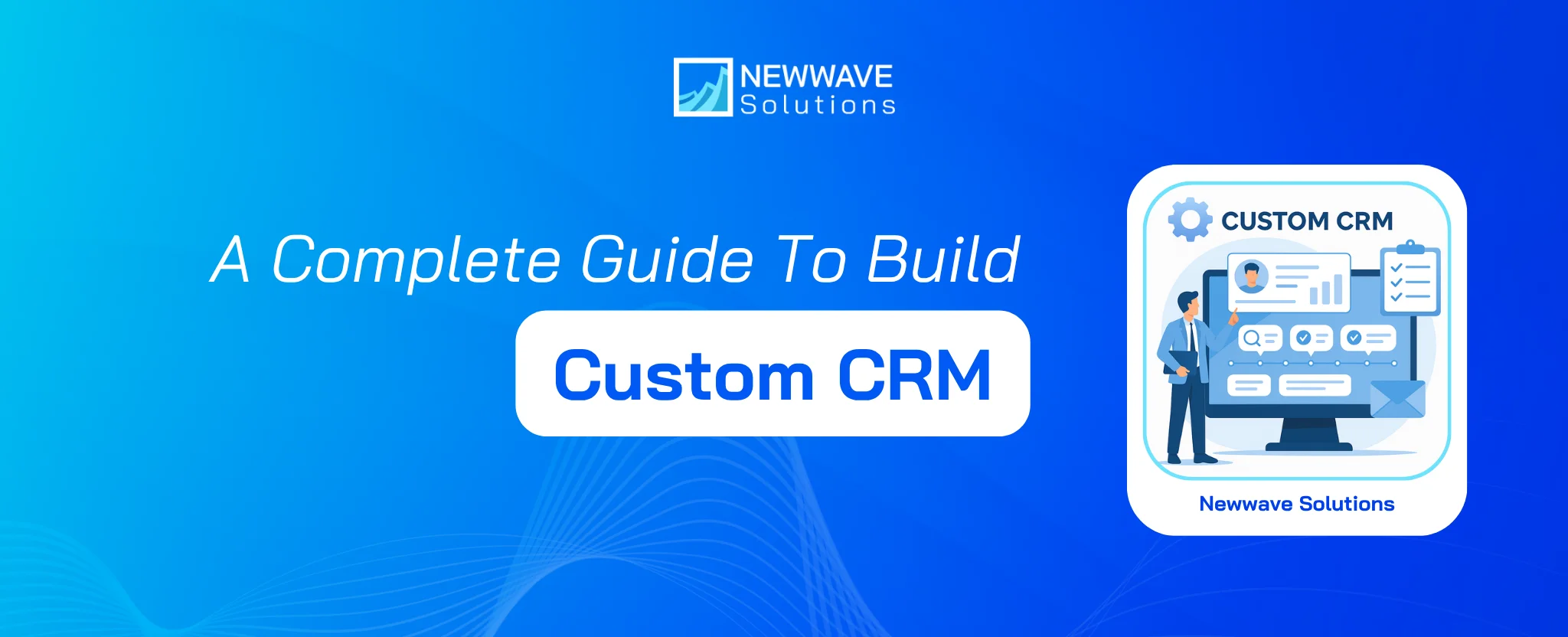
If you want to accelerate deal closures, generate more leads, and organize customer data effectively, a custom CRM is a must-have. Pre-packaged CRM systems might seem convenient, but they also come with restricted adaptability, unnecessary features, and expensive prices.
In case you are unfamiliar with this type of system, our post will guide you through how to build a CRM system from scratch and the essential functionalities of a CRM. Let’s begin, shall we?
Is creating a custom CRM solution worthwhile?
A CRM, or Customer Relationship Management, is a special tool that helps businesses keep track of their relationships with customers. It stores important customer information, like their names, contact details, and interactions with the firm. As mentioned, there are two choices when it comes to getting a CRM: An off-the-shelf system or a custom system. The former is a ready-made package that anyone can buy and start using right away, while the latter is designed from scratch to match the specific requirements of each business
To understand the pros and cons of these two, look at the table below:
| Pre-packaged CRM | Custom CRM | |
| Ease of setup | Ready for immediate use | Requires development before use |
| Flexibility | Limited customizable options | Can be customized to fit specific needs |
| Features | Pre-packaged features may include irrelevant ones | Tailored features, only include what’s necessary |
| Learning curve | Generally easier to learn | May have a steeper learning curve at first |
| Scalability | May not scale well with unique business growth | Can be scaled according to evolving requirements |
| Integration | Limited integration options with other systems | Can be seamlessly integrated with existing tools |
| Cost | Typically lower upfront costs, but ongoing fees will accumulate. May not be cost-efficient with irrelevant features | Higher initial investment, but potential long-term cost savings and efficiency gains |
As you can see, building a CRM system from scratch is the optimal choice since it will fit exactly what your business needs. While the initial cost is higher, a custom CRM eliminates unnecessary functions, helping salespeople access customers’ information quickly. Additionally, custom CRM systems can adapt as your business grows, saving a huge amount of time and money in the long run. That’s a good reason to invest in your own software instead of using turnkey solutions.
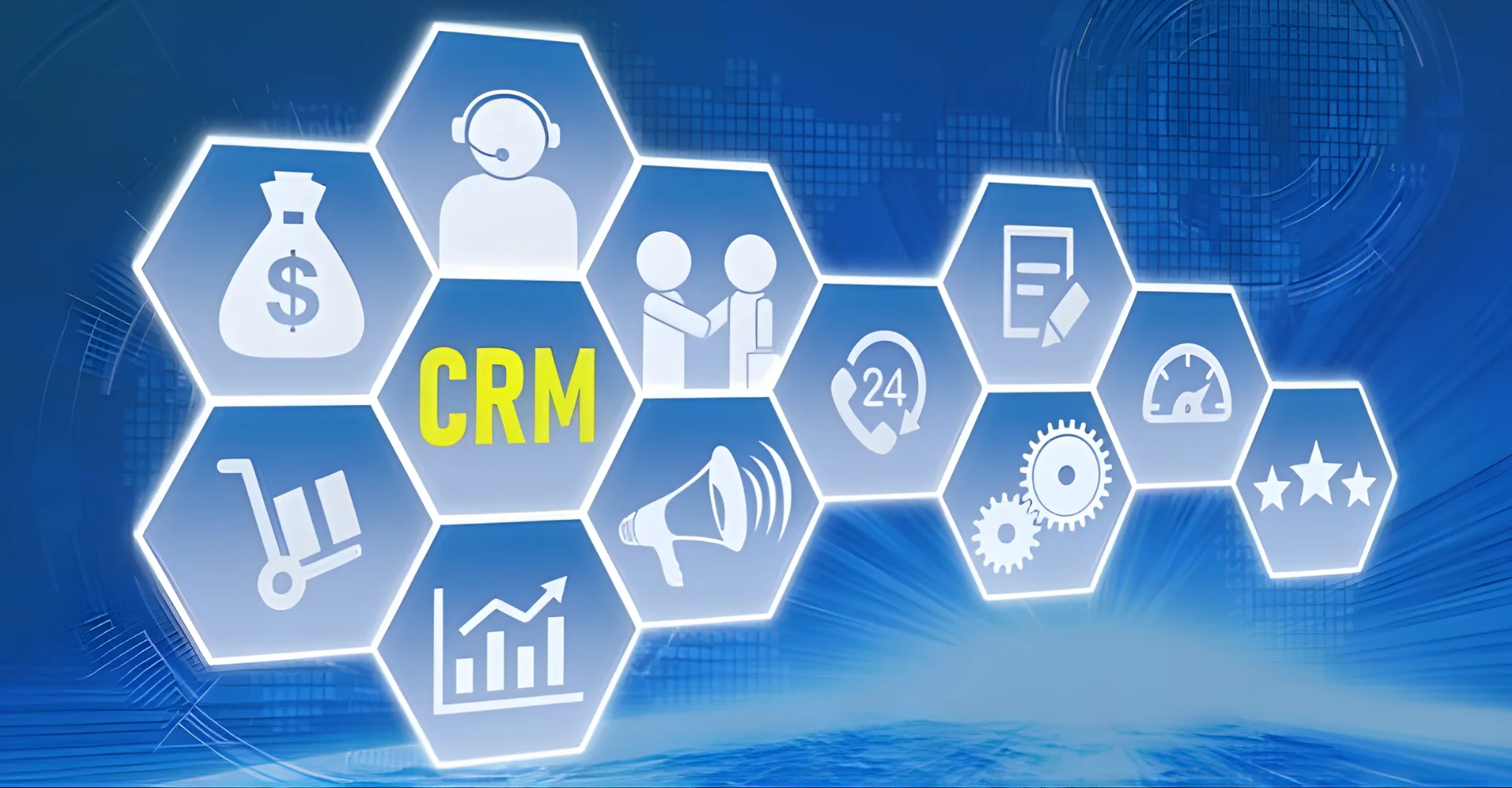
>>> See more: A detailed guide to custom eCommerce development for your business
How to build your own CRM system: 7 simple steps
Like with other software, creating custom CRM systems also requires a development life cycle to ensure high-quality outcomes. This might vary between developers, so in this post, we only introduce the core process.
Here are the key steps on how to build a custom CRM database, divided into two phases:
- Phase 1: Preparation
- Define your goals for creating a CRM
- Pick what type of custom CRM solutions you need
- Determine the functionalities of your system
- Customer support module
- Marketing module
- Sales module
- Phase 2: Development
- Choose a CRM development approach
- Design the system
- Test thoroughly
- Deploy and train users

We will walk you through all of them, one by one:
Phase 1: Preparation
1. Define your goals for creating a custom CRM
While surfing the internet, you can find many ways to create CRM systems. To avoid getting overwhelmed, the first step is to stay focused on the goals of your software. You should figure out what exactly you want your system to do for your business, and how it can help you increase your income.
Here are some of the objectives companies have in mind when developing their custom CRM systems:
- Enhanced customer relationships: Improving customer satisfaction and loyalty by having better insights into their specific needs and behavioral patterns
- Increased sales and revenue: Streamlining sales processes, identifying opportunities for upselling and cross-selling, and providing sales teams with the tools they need to close deals more effectively.
- Scalability and flexibility: Developing a custom CRM system that can adapt to evolving business needs, accommodate growth, and integrate with other systems as required.
- Automation of mundane tasks: According to your business needs, tasks like data input and follow-up prompts can be automated
- Compliance and data security: Ensuring the CRM system complies with relevant regulations (e.g., GDPR, CCPA) and implementing robust security measures to protect sensitive customer information.
2. Select the type of your custom CRM
After you have set goals for your custom CRM solutions, you can decide on the type of CRM. Depending on the purpose, there are three categories to choose from:
- Analytical CRM focuses on analyzing customer data to gain insights into customer behavior, preferences, and trends.
- Collaborative CRM facilitates communication and collaboration between different departments to better serve customers. It integrates various communication channels, such as email, phone, and social media, into a centralized platform.
- Operational CRM focuses on automating and optimizing the day-to-day interactions between an organization and its customers. It involves managing customer-facing processes such as sales automation, marketing automation, and service automation to streamline workflows, improve productivity, and enhance customer experience.
3. Determine the functionalities of your system
Custom CRM may vary by type and business requirements. However, there are still core features that define CRM software. Let’s break them into modules so you can decide which of them works best for you:
4. Customer support module
A custom CRM system simplifies the exchange of information among customer support agents, thus accelerating ticket processing and enhancing customer experience.
Key features of the customer support module include:
- Agen dashboard: A centralized interface where the customer support team can see requests and organize tasks.
- Knowledge base: A repository of FAQs, troubleshooting guides, and product documentation. This feature helps both customers and support agents find solutions independently, reducing support overhead.
- Case reports: These keep track of how many requests you get, how long it takes to solve them, and how satisfied customers are. From there, you can see how well your support team is doing.
5. Marketing module
A custom CRM for marketing aids in monitoring, simplifying, and automating marketing campaigns across different platforms. Its features save time and promote data-driven strategies for your marketing team.
Core features for the marketing module are:
- Analytics and reporting feature provides insights into campaign performance, customer engagement metrics, and ROI. This helps marketers to make data-driven decisions and refine their strategies over time.
- Campaign management assists in planning, executing, and analyzing marketing campaigns across multiple channels.
- Email marketing automation helps automate email campaigns based on customer behaviors, preferences, and lifecycle stages.
- Social media integration plans and schedules your activities on social media to maximize engagement
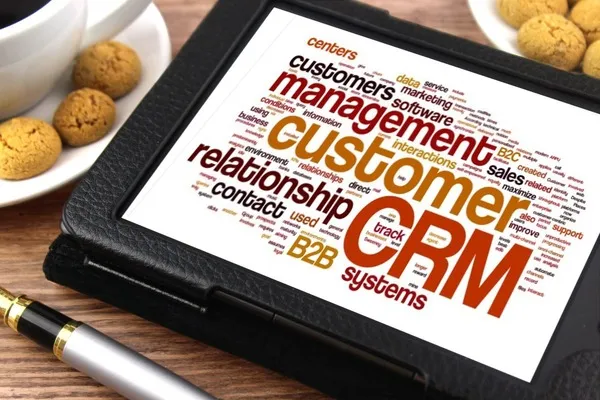
6. Sales module
The sales module of CRM customization serves as a comprehensive toolkit for managing the entire sales process, from lead generation to deal closure.
Key features include:
- Dashboard gives you an overview of your business’s monthly revenues
- Pipeline management visualizes and manages the sales pipeline through customizable dashboards and reports. This feature helps sales managers allocate resources and identify bottlenecks in the sales process.
- Opportunity tracking tracks all the sales opportunities through various stages of the pipeline—from initial contact to negotiation and closure
- Sales automation automates routine sales tasks such as lead assignment, follow-ups, and quote generation
- Task allows you to track the sales team’s activity
- Lead helps you assess the potential of your leads and create strategies to convert them into successful sales.
Phase 2: Development
1. Choose a CRM development approach
Once you’ve got a list of desired features, the next step is to choose a development approach for your custom CRM. Should you develop the CRM system in-house using your internal team or outsource the software development services to a third-party vendor?
Building a CRM system in-house gives you greater control and customization. Your team can tailor the CRM solution precisely to your organization’s unique processes and requirements, ensuring a perfect fit. In addition, building the system internally gives your team a better understanding of how the CRM system works.
However, this option only works if you have a skilled team of developers. In case you don’t, seeking help from a third-party vendor is the best choice. External vendors often have specialized skills and experience in CRM customization/ development, which allow them to deliver the system more efficiently and reduce time-to-market. This benefits organizations that lack the internal capabilities or capacity to undertake CRM development by themselves.
2. Design the custom CRM system
For this step, your developer team or third-party vendor will develop a prototype or minimum viable product (MVP) to validate your design and functionality requirements. This allows the firm to gather feedback from stakeholders and make necessary adjustments before full-scale development.
Once the prototype is approved, they will start building the custom CRM system according to the finalized design and specifications.
3. Test thoroughly
Thorough testing and quality assurance are the most critical steps in the CRM development process. You may be eager to deploy your new system, but launching it before working out the bugs will do more harm than good.
It is advisable to stick with your current CRM for at least a week until the new software has been thoroughly tested. Your developer team or partner can provide several tests, such as security testing, functional testing, etc., to identify and rectify any issues.
4. Roll out the software
Finally, it’s time to roll out your custom CRM. Deploy the system into your production environment and train users to effectively utilize it.
Your technical team or development partner should assist you throughout the entire process, from migrating data to the new platform to providing training programs for your employees.
>>> See more: How to build a CMS – A Step-By-Step Guide
Typical Cost & Timeline for Custom CRM Projects
Building a custom CRM involves several types of costs and flexible timelines depending on your business size, features, and technical complexity. Let’s break down the details below:
Cost Breakdown:
-
Development & Engineering Fees: Custom CRM projects typically range from $25,000–$150,000, depending on modules, integrations, and security needs. Enterprise-grade solutions with AI or analytics features can exceed $250,000.
-
Design & User Experience: Professional UI/UX design service costs about $5,000–$15,000, ensuring a user-friendly interface that improves adoption.
-
Infrastructure & Hosting: Cloud hosting (AWS, Azure, or GCP) adds around $500–$1,500/month based on traffic and data storage.
-
Maintenance & Upgrades: Annual maintenance usually equals 15–25% of total project cost, covering bug fixes, version updates, and technical support.
-
Integration & API Costs: Connecting the CRM to ERP, marketing automation, or third-party tools often adds $2,000–$10,000 depending on complexity.
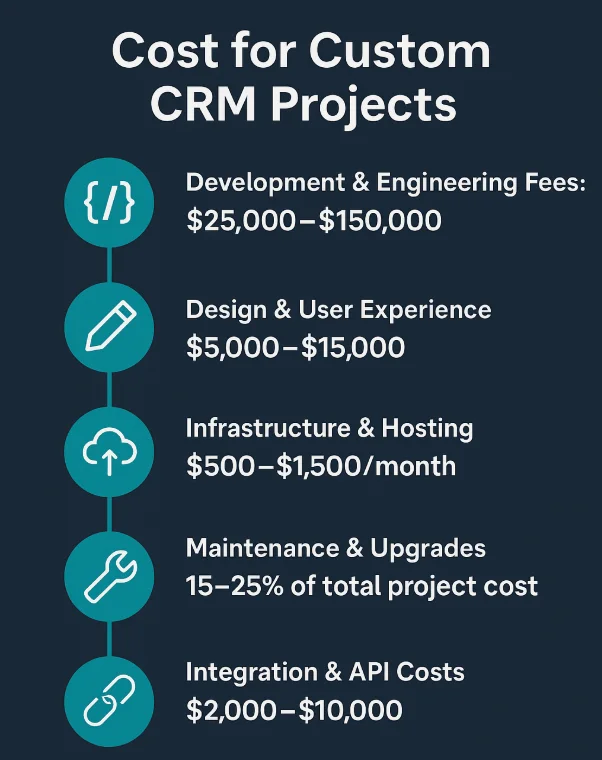
Timeline Overview:
-
Discovery & Planning (2–4 weeks): This stage includes business analysis, requirements gathering, and defining KPIs.
-
Design & Prototyping (3–5 weeks): Teams create wireframes and user journeys for approval before coding begins.
-
Development & Testing (3–6 months): Core modules are built, integrated, and QA-tested using Agile sprints.
-
Deployment & Training (2–4 weeks): The CRM is launched, and staff are trained to ensure smooth adoption.
-
Post-Launch Optimization (ongoing): Continuous monitoring and optimization are performed to align with evolving business processes.
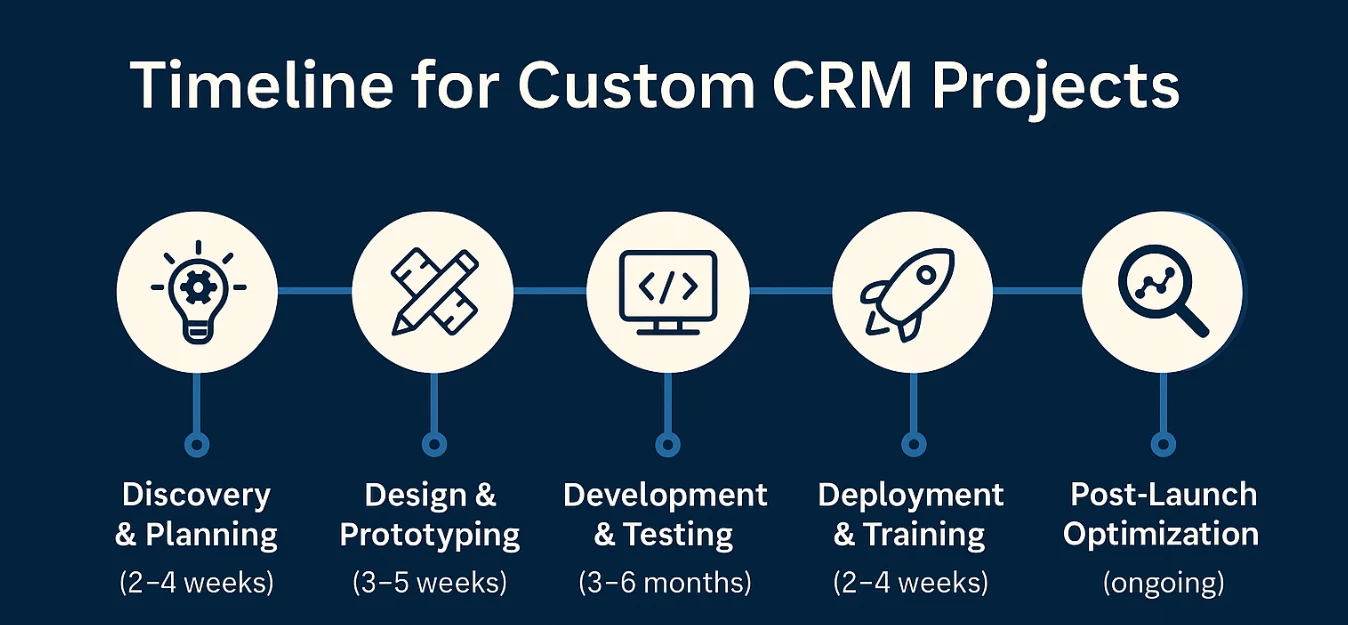
Choosing the Right CRM Development Partner: Newwave Solutions
Developing a custom CRM can be complex, time-consuming, and resource-intensive. Outsourcing to a professional partner like Newwave Solutions is the smartest way to ensure quality, speed, and scalability — especially when your business lacks in-house resources. With over 14+ years of IT expertise, Newwave Solutions specializes in delivering tailor-made CRM solutions that unify customer data, streamline workflows, and boost engagement.
Overview
Newwave Solutions is a leading software development company with proven experience in building enterprise-grade solutions for finance, healthcare, retail, and other industries. Our CRM development services cover the full lifecycle — from consulting and strategy to system design, integration, and long-term maintenance — enabling businesses to manage customers more efficiently and build stronger relationships through technology.
What Our CRM Services Deliver
- CRM Consulting & Strategy: We analyze your processes and craft a CRM roadmap aligned with your business goals.
- Custom Module Development: Our team designs unique modules tailored to your operations, from sales automation to marketing analytics.
- Integration & Data Migration: We ensure seamless synchronization with ERP, accounting, or third-party tools without data loss.
- UI/UX Design & Optimization: Our designers deliver clean, intuitive dashboards that enhance user experience and adoption.
- Maintenance & Support: Continuous system upgrades, monitoring, and feature expansion keep your CRM running smoothly.
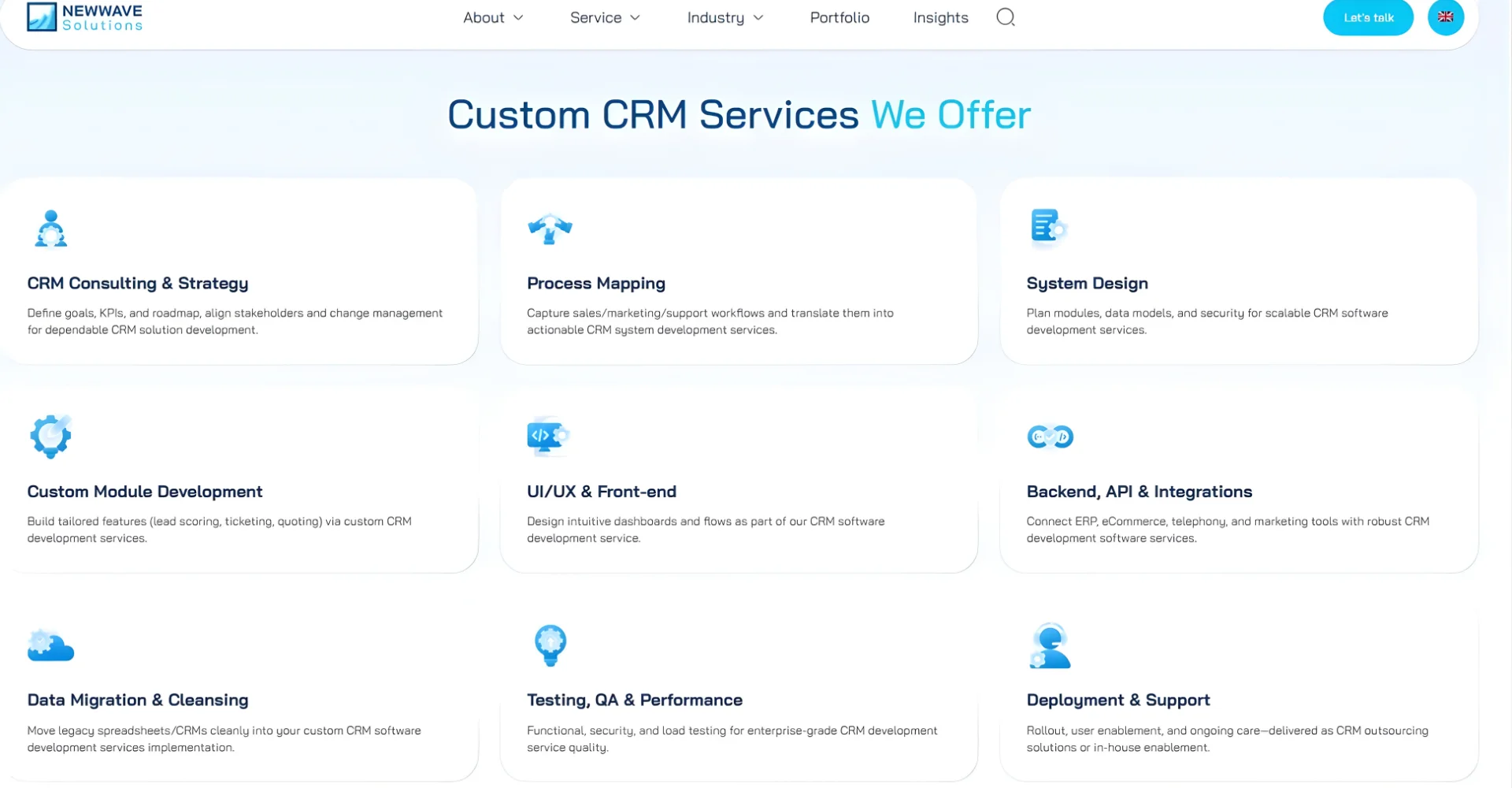
Why Choose Our Services
- Proven Expertise: 14+ years of delivering enterprise-grade CRM systems across major industries.
- Consultative Approach: Every project begins with deep discovery, user research, and measurable KPI design.
- End-to-End Delivery: We handle everything from the initial roadmap to final rollout with transparent communication.
- Integration Excellence: Robust API connectors ensure flawless data flow across your tools and platforms.
- Security & Compliance: Built-in encryption, access control, and GDPR-ready infrastructure safeguard customer trust.
- Flexible Engagement Models: Choose between dedicated teams or individual CRM experts on demand.
- Post-Launch Partnership: We provide ongoing optimization and maintenance to ensure your CRM evolves with your business.
FAQs
1. How much does it cost to build a custom CRM?
The price range for a basic CRM system often falls between $20,000 and $30,000. However, for larger enterprises requiring more extensive customization and features, the cost may exceed $150,000. Discuss with your development team beforehand to obtain accurate cost estimates based on your specific requirements.
2. How long does it take to build a custom CRM?
The timeline for building a custom CRM can vary depending on the complexity of the project, the availability of resources, and the development approach. Simple CRM systems may take a few months to develop, while more complex systems could take six months to a year.
3. What kind of technical expertise is needed to create a custom CRM?
Building a custom CRM requires proficiency in coding languages like Java or Python for creating the system’s backbone, and skills in HTML, CSS, and JavaScript for designing the user interface. Database management skills are also essential for designing and optimizing the database architecture.
Final verdict
A custom CRM is like a tailor-made suit for your business – it fits just right. Whether you are a small startup or a big corporation, knowing how to build a CRM can boost efficiency, improve customer relationships, and make more profit in the long run.
So, why settle for an off-the-rack solution when you can have the optimal one just for you? Consider Newwave Solutions as a worthwhile investment if you are planning to build your own custom CRM from scratch.
Contact information:
- Head Office (Hanoi): 1F, 4F, 10F, Mitec building, Cau Giay ward, Hanoi city, Vietnam
- Branch Office (Tokyo): 1-chōme-11-8 Yushima, Bunkyo City, Tokyo 113-0034, Japan
- Hotline: (+84) 985310203
- Email: [email protected]
- Website: newwavesolution.com
To Quang Duy is the CEO of Newwave Solutions, a leading Vietnamese software company. He is recognized as a standout technology consultant. Connect with him on LinkedIn and Twitter.

Read More Guides
Get stories in your inbox twice a month.
Let’s Connect
Let us know what you need, and out professionals will collaborate with you to find a solution that enables growth.
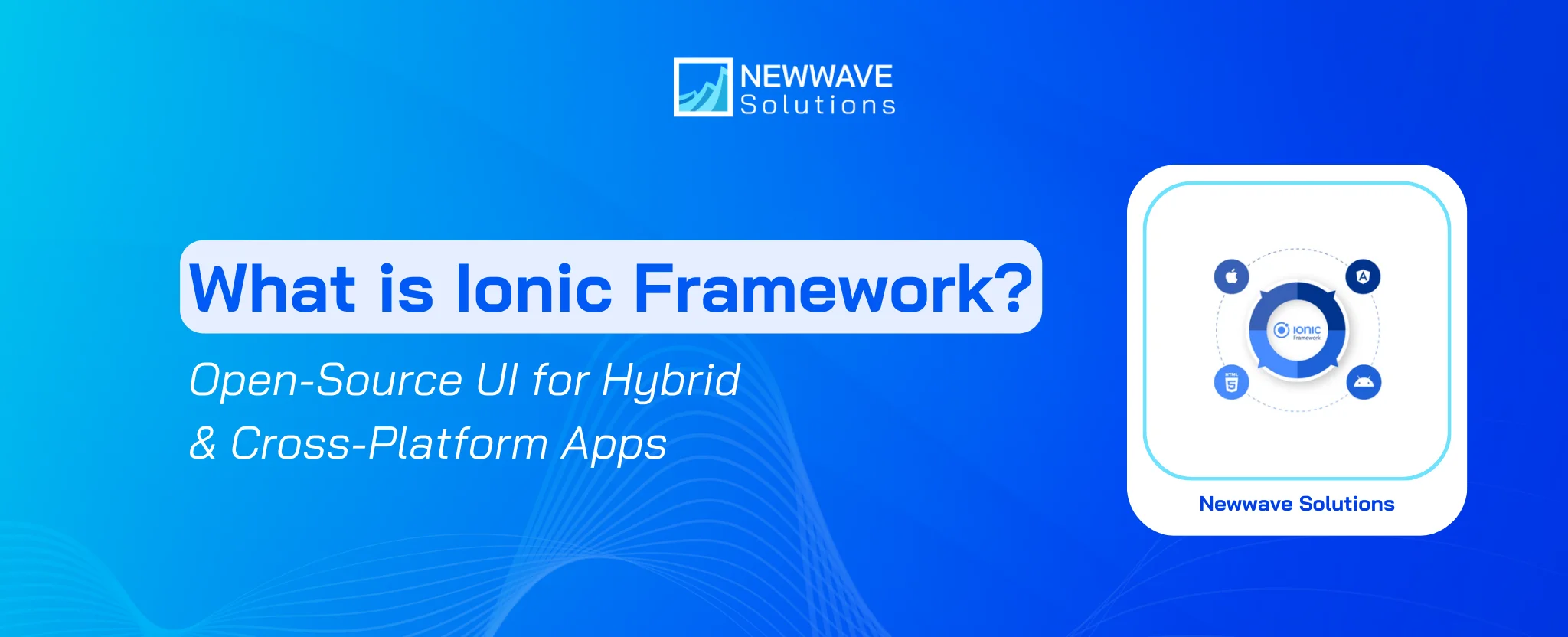



Leave a Reply